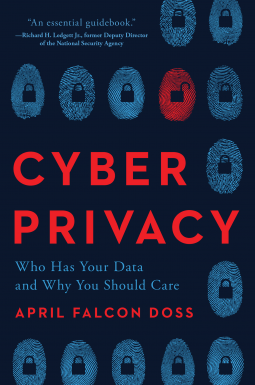
Cyber Privacy
Who Has Your Data and Why You Should Care
by April Falcon Doss
This title was previously available on NetGalley and is now archived.
Send NetGalley books directly to your Kindle or Kindle app
1
To read on a Kindle or Kindle app, please add kindle@netgalley.com as an approved email address to receive files in your Amazon account. Click here for step-by-step instructions.
2
Also find your Kindle email address within your Amazon account, and enter it here.
Pub Date Nov 03 2020 | Archive Date Dec 01 2020
Talking about this book? Use #CyberPrivacy #NetGalley. More hashtag tips!
Description
"Chilling, eye-opening, and timely, Cyber Privacy makes a strong case for the urgent need to reform the laws and policies that protect our personal data. If your reaction to that statement is to shrug your shoulders, think again. As April Falcon Doss expertly explains, data tracking is a real problem that affects every single one of us on a daily basis."
—General Michael V. Hayden, USAF, Ret., former Director of CIA and NSA and former Principal Deputy Director of National Intelligence
You're being tracked.
Amazon, Google, Facebook, governments. No matter who we are or where we go, someone is collecting our data: to profile us, target us, assess us; to predict our behavior and analyze our attitudes; to influence the things we do and buy—even to impact our vote.
If this makes you uneasy, it should.
We live in an era of unprecedented data aggregation, and it's never been more difficult to navigate the trade-offs between individual privacy, personal convenience, national security, and corporate profits. Technology is evolving quickly, while laws and policies are changing slowly.
You shouldn't have to be a privacy expert to understand what happens to your data.
April Falcon Doss, a privacy expert and former NSA and Senate lawyer, has seen this imbalance in action. She wants to empower individuals and see policy catch up.
In Cyber Privacy, Doss demystifies the digital footprints we leave in our daily lives and reveals how our data is being used—sometimes against us—by the private sector, the government, and even our employers and schools. She explains the trends in data science, technology, and the law that impact our everyday privacy. She tackles big questions: how data aggregation undermines personal autonomy, how to measure what privacy is worth, and how society can benefit from big data while managing its risks and being clear-eyed about its cost.
It's high time to rethink notions of privacy and what, if anything, limits the power of those who are constantly watching, listening, and learning about us.
This book is for readers who want answers to three questions: Who has your data? Why should you care? And most important, what can you do about it?
Advance Praise
“In Cyber Privacy, April Falcon Doss has written the most sweeping, revealing, and understandable book about privacy and our digital lives . . . A must-read if you want to understand how both businesses and governments know so much about you and how our society needs to adapt to preserve an individual's sense of identity.”
—Glenn Gerstell, senior advisor, Center for Strategic and International Studies, and former general counsel, National Security Agency
“We all have serious—but too often vague—concerns that every day computer usage poses a dire threat to our personal and financial well-being, as well the nation’s security. In her new book Cyber Privacy, April Falcon Doss—the nation’s leading expert on this subject—not only tells why that is so, but in a clear and engaging way arms us with strategies to protect ourselves, our loved ones, and the nation itself from life-threatening assaults on our privacy.”
—Michael Greenberger, professor, University of Maryland Carey Law School and director of the Center for Health and Homeland Security, University of Maryland
“From big tech companies, retailers, advertising companies, through to the police and intelligence agencies of the US and beyond, this is an absolutely critical read for anyone who wants to understand the complex, and often unintuitive, consequences of living in our increasingly data-driven world.”
—Matt Tait, independent cybersecurity expert, formerly at GCHQ and Google Project Zero, and former senior cybersecurity fellow at the Robert Strauss Center for International Security and Law at the University of Texas at Austin
“A brilliantly written tour de force on privacy in the 21st century. Combining decades of experience on all sides of the privacy debate, Doss combines incisive analysis of disruptive technologies, underlying economics, and increasingly complex legal overlays to deliver an essential primer on the fraught privacy landscape.”
—Chris Inglis, deputy director, NSA, 2006–2014
“At a time when most internet users do not understand the complex concoction of algorithms, engagement, microtargeting, and personal data profiles that curate the information they see, April Falcon Doss uses her multi-sector experience to make privacy accessible to all. Anyone who cares about maintaining a grip on their personal information—or at least being informed about what's happening with it—should read this book."
—Nina Jankowicz, author of How to Lose the Information War
“Without losing sight of the substantial benefits that are achieved through collecting and analyzing personal information on a massive scale, Doss exposes the unregulated practices of the large data collectors—including Apple, Amazon, Facebook, and Google—then examines the regulated practices of the Intelligence Community and the constraints—good and bad—on law enforcement activities . . . This book makes the case that we seriously need to re-examine what we are doing, and it provides useful guidance on where and how we can start to make meaningful changes that will benefit most everyone.”
—David C. Shonka, former acting general counsel, Federal Trade Commission, and privacy partner at Redgrave LLP
“April Falcon Doss has provided a vital contribution to our understanding of privacy and cybersecurity. Cyber Privacy provides laymen and experts alike with a rich understanding of the laws and technology that shape our ability to control who accesses our personal information and what they do with it.”
—Jeff Kosseff, author, The Twenty-Six Words That Created the Internet
"Whether you are a technology user, a compliance or privacy officer, or a practicing lawyer, this book will help in understanding the complex intersections of technology, the internet economy, the role of the state, and the uses of personally identifiable information and metadata . . . An essential guidebook."
—Rick Ledgett, former deputy director, NSA
“April Falcon Doss thoughtfully, expertly and critically informs and navigates the reader across an amazing number of privacy invasion scenarios to an extent not seen in previous publications . . . Novice and expert readers alike will profit from this important book.”
—William H. Murphy, Jr., former judge and prominent civil rights attorney
"April Falcon Doss has spent a career at the National Security Agency, Senate intelligence committee, and in private practice influencing the decisions that shape technology, cybersecurity, and data privacy. In this book, Doss turns twenty years of perspective and experience into a Cyber Privacy road map to guide those looking to understand how data came to rule our world and where we go from here."
—Susan Hennessey, author of Unmaking the Presidency
Available Editions
| EDITION | Other Format |
| ISBN | 9781948836920 |
| PRICE | $27.95 (USD) |
| PAGES | 300 |
Links
Average rating from 8 members
Featured Reviews
This is a book about pervasive data collection and its implications. The author, April Falcon Doss, is a lawyer who spent 13 years at the US National Security Agency (NSA), itself an organization controversial for phone-tapping and other covert surveillance practices. Disturbing though that is, one of Doss’s observations is that “in democratic countries … the government doesn’t have nearly as much data as private companies do.” She argues that government-held data is less troubling since its usage is well regulated, unlike privately held data – though these safeguards do not apply in authoritarian regimes.
Government use then is just one piece of something much bigger, the colossal amount of personal data gathered on so much of what we do, our buying habits, what we search for on the internet, our health, our location, our contacts, tastes and preferences, all tracked, stored, and used in ways that we might not expect. Most of the book simply describes what is happening, and this will be eye-opening to anyone who has not followed the growth of data collection and its use in marketing and advertising over the last twenty years or so. Doss describes how a researcher analyzed his iPhone activity and found that "within seven days, the phone had exported data via 5,400 hidden app trackers." - and Google's Android is even worse.
How much do we care and how much should we care? Doss looks at this question which to me is of particular interest. We like getting stuff for free, like social media, search, maps and directions; but how aware are we of hidden costs like compromised privacy and would we be willing to pay in other ways? Studies on the subject are contradictory; humans are not very logical on the matter, and it depends exactly how the trade-off between privacy and cost is presented. The tech giants know this and in general we easily succumb to the temptation to hand over personal information when signing up for free services.
Doss makes some excellent and succinct points, as when she writes that “privacy policies offer little more than a fig leaf of user notice and consent since they are cumbersome to read, difficult to understand, and individuals have few alternatives when it comes to using the major digital platforms.” She also takes aim at well-intended but ineffective cookie legislation – which have given rise to the banners you see, especially in the EU, inviting you to accept all manner of cookies when you visit a web site for the first time. “A great deal of energy and attention has gone into drafting and implementing cookie notice laws,” she says. “But it is an open question whether anyone’s privacy has actually increased.”
She also observes that we are in uncharted territory. “It turns out that all of us have been unwitting participants in a multifaceted, loosely designed program of unregulated research,” she writes.
Personally I agree that the issue is super-important and deserves more attention than it gets, so I am grateful for the book. There are a couple of issues though. One is that the reason personal data gathering has escalated so fast is that we’ve seen benefits – like free services and personalisation of advertising which reduces the amount of irrelevant material we see – but the harms are more hidden. What are the harms? Doss does identify some harms, such as reduced freedom in authoritarian regimes, or higher prices for things like Uber transport when algorithms decide what offers to show based on our willingness to pay. I would like to have seen more attention paid though to the most obvious harm of the moment, the fact that abuse of personal data and social media may have resulted in political upheavals like the election of Donald Trump as US president, or the result of the Brexit referendum in the UK. Whatever your political views, those who value democracy should be concerned; Doss gives this matter some attention but not as much as it merits, in my opinion.
Second, the big question is what can be done; and here the book is short of answers. Doss ends up arguing that we have passed the point of no return in terms of data collection. “The real challenge lies in creating sufficient restrictions to rein in the human tendency to misuse information for purposes that we’ve collectively decided are unacceptable in society,” she writes, acknowledging that how we do so remains an open question.
She says that her ambitions for the book become more modest as the research continued, ending with the hope that she has provided “a catalogue of risks and relevant questions, along with a useful framework for thinking about the future” which “may spark further, future discussions.”
Fair enough, but I would like to have seen more practical suggestions. Should we regulate more? Should Google or Facebook be broken up? As individuals, does it help if we close social media accounts and become more wary about the data that we give away?
Nevertheless I welcome this thought-provoking book and hope that it does help to stimulate the future debate for which the author hopes.
The book deserves to be viewed by the general public, not just people with a direct interest in the topic of cyberspace and how it is used.
The author develops and complements questions related to personal data use and not only - the main question we all need to ask ourselves: should we be interested in our rights online, and if so - why are we not interested? The book is a great addition to the conversations on these topics, and the author has something to say, given the extensive experience in cyberspace and the rights in it. Four-star because I feel the book needed to provide more tips and advice on how to proceed in our current online life.


















